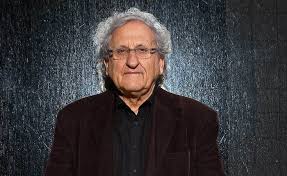De Israëlische schrijver Abraham B. Jehoshua werd geboren op 9 december 1936 in Jeruzalem. Van 1954 tot 1957 diende Jehoshua bij de Israëlische parachutistenbrigade en vocht hij in de Sinaï-campagne. Vanaf 1957 studeerde hij literatuur en filosofie aan de Hebreeuwse Universiteit in Jeruzalem. Zijn eerste literaire pogingen dateren ook uit deze tijd. In 1962 debuteerde hij met succes met een bloemlezing van verschillende verhalen. Gedurende deze tijd trouwde hij met de psychoanalytica Rivka, met wie hij drie kinderen heeft. In 1963 ging Jehoshua naar de Sorbonne in Parijs en verbleef daar tot 1967. Parallel aan zijn academische taken was hij in die tijd secretaris-generaal van de World Union of Jewish Students. In 1972 accepteerde hij een positie aan de Universiteit van Haifa, waar hij vergelijkende literatuurwetenschap en Hebreeuwse literatuur gaf. Slechts onderbroken door een paar studiebezoeken in het buitenland: 1974 Writer in Residence aan St Cross College (Universiteit van Oxford) en gasthoogleraar aan Harvard University (1977), Chicago (1988, 1997, 2000) en Princeton (1982). Jehoshua is een van de meest beroemde en populaire schrijvers in Israël. Zijn werk omvat verhalen, romans, toneelstukken en politieke essays. Jehoshua zelf beschouwt William Faulkner, Samuel Agnon en Franz Kafka als zijn belangrijkste rolmodellen. In zijn literaire werk behandelt Jehoshua herhaaldelijk belangrijke politieke kwesties. De roman “De minnaar” speelt zich af in 1973 in Israël ten tijde van de Yom Kippur-oorlog. De politieke en militaire omstandigheden worden weerspiegeld in het verval van een gezin. De plot wordt gepresenteerd vanuit zes verschillende perspectieven, waaronder die van een Arabier. In zijn roman “Reis naar het einde van het millennium” vermengen de Arabische en Joodse werelden zich in de middeleeuwen in het jaar 1000. In zijn roman “De bevrijdende bruid” zijn de zwakke of falende mannen symbolen van tekorten of zelfs het falen van het zionisme.
Uit: The Liberated Bride (Vertaald door Hillel Halkin)
“HAD HE KNOWN that on this evening, on the hill where the village held its celebrations, an evening suffused by the scent of a fig tree bent over the table like another, venerable guest, he would again be struck-but powerfully-by a sense of failure and missed opportunity, he might have more decisively made his excuses to Samaher, his annoyingly ambitious M.A. student, who, not content with sending him an invitation by mail and then repeating it to his face, had gone and chartered a minibus, after first urging the new department head to make sure the faculty attended her wedding. It wasn’t just for her sake, she said. It would be a gesture to all the university’s Arab students, without whom-the cheek of it!-the department would count for nothing.His wife, Hagit, who knew all too well how weddings had depressed him in recent years, had warned against it. “Why do you need the aggravation?” she had asked. “But they’re Arabs,” he’d answered mildly, with the innocence of a man pursuing an academic interest. “As opposed to what?” she had wanted to know. “Human beings?” “On the contrary…on the contrary…” he had tried defending himself, at a loss to explain how Arabs, although not among the many objects of his envy, could be more human than anyone else.
Yet the snake of envy, his companion of many years, had slithered after him here too, to the little village of Mansura high up in the Galilee, near the Lebanese border. It had lain coiled in the incense of the glowing grilled lamb and writhed to the Oriental music that, despite its sobbing grace notes, secretly aspired to the savage disco beat of a Jewish wedding party-and now, as the student bride presented him not with the seminar paper she was a year late in finishing, but with her groom, it injected its venom.
Many hands had done their best to beautify Samaher, causing him to wonder for a moment whether he was looking at the same woman who had taken nearly all of his courses for the past five years. High heels and a swept-up hairdo had made her taller, and her usually restless eyes, chronically resentful when not anxiously scheming-the eyes of an active member of the Arab Student Committee-were smiling and relaxed. She was also without her glasses, and her eyes were heavily made up with a kohl so unusually tinted that he suspected it of having been smuggled across the border from Lebanon. A bright rouge masked the pimples that wandered as a rule from her cheeks to her throat and back again, and her long wedding gown bestowed a harmony, if only for a single night, on a figure not known for its sartorial coordination. Brimming with pride at having enticed him, the most senior and eminent of her teachers, to honor her and all Araby with his presence, she extended a hand quivering with excitement to his wife.”

